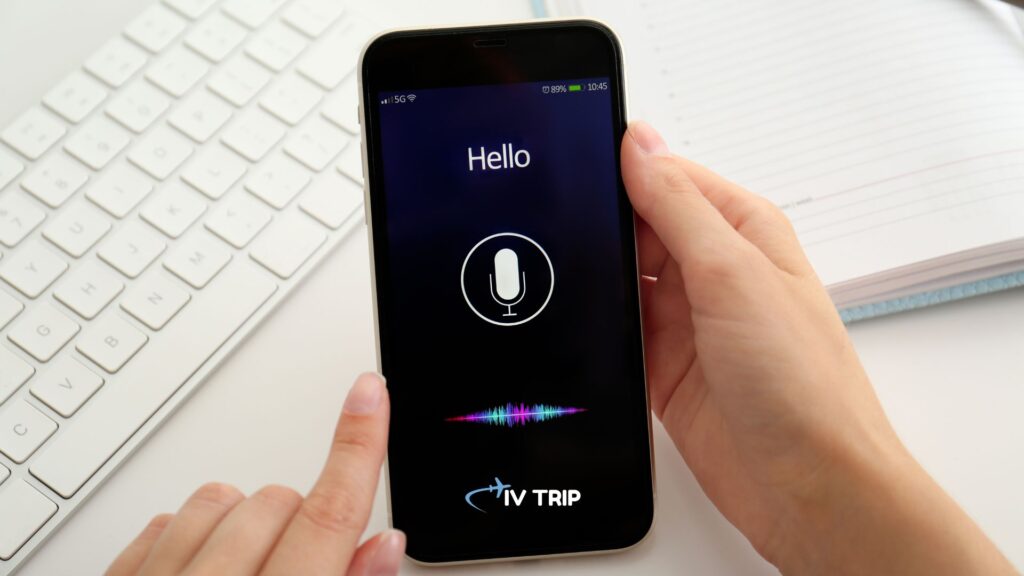Voice Search Optimization for Travel: Essential Tips

https://ivtrip.implevista.com/voice-search-optimization-for-travel/Voice Search Optimization and Travel
Voice search is changing how people plan and book trips. With assistants like Google Assistant, Siri, and Alexa everywhere, more travellers are using spoken queries instead of typing. To reach them, travel brands need voice search optimization—creating content and technical SEO that matches natural, conversational questions. This guide explores trends, strategies, and the future of smart speakers.
Adoption is growing fast. Surveys show that about 40% of U.S. internet users use a voice assistant each month. There are now over 200 million smart speakers in the U.S. Travellers rely on voice for tasks like “What are the best hotels near me?” or “When is the next flight to Dhaka?” In tourism, people increasingly use voice commands to book flights, find hotels, check the weather, and navigate destinations. By focusing on voice technology and strong voice search optimization, travel companies can capture this rising audience and stay ahead of competitors.
Why Voice Search Matters for Travel Businesses
Travellers want quick, hands-free answers. Voice search delivers exactly that, whether through smartphones or smart speakers. HubSpot reports that 72% of people use voice assistants on phones, and 35% use smart speakers. Most of these searches are local or destination-based (like “flights to Bali” or “best tourist spots in Cox’s Bazar”). For travel agencies, voice search optimisation is key to showing up in these results. Since devices usually give only the top 1–3 answers, ranking well can significantly boost visibility.
Voice technology goes beyond search. In hotels or cars, smart speakers can suggest attractions, convert currency, or call rides. Assistants act like virtual travel agents, handling requests such as “Book me a taxi at 6 AM” or “What time is my flight?”. Travel brands that invest in voice search optimisation gain an edge by being ready for these real-world use cases.
Put simply, voice search connects online queries with offline travel experiences. Success depends on content that matches how people actually speak. That’s why voice search optimization often means writing in a conversational tone, using question-based formats, and offering clear, direct answers. Adding an FAQ section with traveler-style questions—like “What’s the baggage allowance for XYZ airline?”—and concise responses can make your site more voice-friendly.
Voice Technology and Smart Speakers in Travel
Voice search isn’t just about phones; smart speakers and in-vehicle assistants are reshaping travel interactions. Devices like Amazon Echo, Google Nest, and smartphone assistants (Siri, Google Assistant) offer hands-free search and voice apps. Travel brands can develop voice apps (e.g. an Alexa “skill”) that let users ask about deals, flight status, or tour packages. For example, a guest in a hotel might say, “Alexa, ask [HotelName] about spa services,” and get an immediate spoken response. This voice technology integration can enhance customer service and brand engagement when paired with innovative voice search optimisation strategies.
Travel agencies are also experimenting with voice interfaces. An IV Trip study notes that future travel software will include “Voice and Chat Interfaces” so customers can book by voice via intelligent assistants. Imagine a travel platform where you literally speak your itinerary into an intelligent assistant and receive real-time booking results. As one guide to travel tech observes, platforms should stay on the cutting edge, adding voice-booking features and AI modules regularly. By integrating with voice platforms and adopting voice search optimization practices, agencies can serve clients through whatever device the customer prefers—smartphone, smart speaker, or in-car system.

The Future of Smart Speakers
The future of smart speakers in travel looks very promising. Analysts predict continued growth in voice-enabled devices, with the global voice market value reaching tens of billions by 2030. For travel, this means more travellers will use voice at every trip stage: researching destinations, comparing hotels, booking transport, and requesting customer support. Smart speakers are becoming multi-modal (with screens and cameras), enabling richer travel interactions (e.g., video itineraries and language translation).
Travel brands should prepare for a world where voice is ubiquitous. This includes localising content for voice (handling multilingual queries), and experimenting with voice-driven experiences like interactive maps you navigate by voice, or travel podcasts you can ask questions about. As voice assistants get smarter, they’ll provide personalised travel recommendations based on user preferences and history. The travel industry will need to focus heavily on voice search optimisation, ensuring they rank when users speak their queries out loud. In practice, that means anticipating questions like “What’s the weather in Cox’s Bazar this weekend?” or “Find me a 4-star hotel in Sylhet,” and providing natural, voice-friendly answers.
Voice Search Trends in Travel
Understanding current voice search trends helps target content effectively. Travellers tend to use their voices for longer, more conversational queries. Instead of typing “cheap flights Dhaka,” someone might ask, “Hey Google, what are the cheapest flights to Dhaka this month?” This shift toward long-tail, question-based queries is key. Data suggests that over 80% of voice answers come from top-three search results, and voice search optimization often involves creating detailed, structured content of 2,000+ words that aligns with natural speech.
Another trend is that voice search is highly local. A striking 76% of voice searches are “near me” queries or regional in nature. For travel, this is golden. For example, someone might ask, “Where is the closest tourist information centre?” or “What can I do in [current city]?” Ensuring your site has optimized local pages (with city names, landmarks) and a filled Google Business Profile is vital. Many intelligent assistants leverage Google Maps data and Yelp/TripAdvisor reviews in answers. To capture these, travel businesses must combine local SEO with voice search optimization to appear in featured snippets and local listings.
Voice search adoption is also demographic. Younger travellers and tech-savvy users adopt it faster, but even older demographics are increasingly comfortable with voice assistants. In travel, voice can help accessibility – for example, visually impaired users may rely on spoken travel content. Globally, voice search use is rising year-over-year, and the tourism sector is no exception. A HubSpot survey noted that 40% of U.S. adults use voice assistants monthly, underscoring a sizeable potential market. For travel companies, ignoring voice search optimization at this stage means falling behind competitors who are already positioning themselves for this shift.

Optimising Your Site for Voice Search
To capture voice-driven traffic, travel sites need intelligent voice search optimization. Here are the essentials:
- Target Conversational, Long-Tail Keywords: Voice queries are longer and sound like natural speech. Use tools like AnswerThePublic or Google’s “People also ask” to find real traveller questions (e.g. “What is the best time to visit Cox’s Bazar?”). Answer them directly in FAQ-style content.
- Use FAQ and Schema Markup: Structured data like FAQPage and Speakable schema helps assistants pull your answers. This is a direct boost for voice search optimization since devices prefer explicit, ready-to-read Q&A content.
- Localise for “Near Me” Queries: Many voice searches are location-based. Keep your Google Business Profile updated, publish city-specific pages, and encourage reviews. Local SEO is inseparable from voice search optimization in travel.
- Be Mobile-Friendly and Fast: Most voice searches happen on mobile. Optimize Core Web Vitals, compress images, and avoid slow or clunky design. Mobile speed directly impacts voice search optimization and bookings alike.
- Write in a Conversational Tone: Keep it natural, simple, and direct—like how people speak. This makes your content more likely to be picked up in voice answers.
- Aim for Featured Snippets: Assistants often read Position Zero. Use short answers, bullet lists, or step-by-step instructions to maximise your chances.
- Maintain Content Quality: Voice assistants value authority and accuracy. Keep travel details current, cite official sources, and deliver reliable information. Strong content is the foundation of sustainable voice search optimization.
Technical Aspects: Speakable Markup and Schema
Getting the technical side right is just as crucial for voice search optimization as writing good content. Here’s what to focus on:
- Speakable Content: Google recommends using the Speakable schema to highlight parts of your page that work well for text-to-speech. For example, mark up a summary of a travel news article or a short section about flight deals. This helps Google Assistant read those sections aloud. For strong voice search optimization, keep these snippets short (20–30 seconds) and focused on key facts.
- Other Schema Markup: Add structured data like LocalBusiness, TouristAttraction, Hotel, FAQPage, and Article. For instance, a hotel page can include details like address, amenities, and check-in times. With proper markup, this data is more likely to be pulled into voice answers. Schema plays a significant role in voice search optimization because it helps Google understand your content clearly.
- Technical SEO Basics: None of this works if your site isn’t crawlable. Make sure you have a clean sitemap, a valid robots.txt, HTTPS, and a mobile-first design. Fix broken links, check indexing issues, and use Google Search Console to test your structured data. Since most voice results come from secure and fast-loading sites, technical SEO directly supports voice search optimization.
In short, schema and technical health are the backbone of voice search optimization, ensuring your content is both visible and usable for voice devices.

Leveraging Voice Technology in Travel Marketing
Voice search isn’t only for informational queries; it opens new marketing channels:
- Voice Apps and Skills: Many travel companies are creating voice apps (“skills”) for Alexa or Actions for Google Assistant. These can deliver travel tips, promotional offers, or loyalty account info. For example, a cruise line might have a voice app that answers “What excursions are available tomorrow on my cruise?” or “Tell me my account status.” Building a custom voice experience requires following platform guidelines (Amazon and Google provide developer docs). Still, it directly taps users who prefer speaking over typing.
- Voice in Customer Service: Incorporate voice chatbots or IVR (Interactive Voice Response) for customer support. Call centres can use voice AI to answer routine booking questions automatically. For instance, calling a travel agency’s support line might trigger an AI voice assistant that can reschedule a trip or answer visa queries without human help. This ties into the broader voice technology trend of omnichannel service. IV Trip’s research predicts travel platforms will increasingly include voice chat interfaces for seamless booking.
- Voice Commerce: Shopping by voice is on the rise. Travellers often research and book via mobile devices; voice can make this hands-free. For example, a user could say “Add travel insurance to my cart” on a tour operator’s website if a voice assistant feature is enabled. E-commerce voice shopping is expected to reach $40+ billion soon. Travel companies should integrate voice commerce features (e.g., Amazon Pay through Alexa) and list clear product/service names so voice purchase commands work effectively.
- Accessibility and Multilingual Support: Voice search allows people to search in their preferred language or dialect. For travel brands, providing multilingual content improves reach. A hotel site might have content in Bengali, English, and Chinese, and Alexa/Assistant will match the user’s language. Ensuring your site’s metadata and content cover multiple languages can capture more voice queries.
- Future Ideas: Emerging voice tech includes AI interpreters (voice devices translating languages in real-time) and even emotion-aware assistants. Smart speakers might soon read your tone and offer empathetic responses. Travel firms should monitor these voice technology trends and consider pilot programs (e.g., voice itineraries or guided audio tours delivered through smart devices).
Measuring Success and Next Steps
As with any channel, track how voice search brings value. Use Google Analytics and Google Search Console to see which pages get voice traffic (look for queries phrased as questions). Monitor featured snippet appearances and local pack rankings. Tools like SEMrush or AnswerThePublic (mentioned in our SEO guide) can identify new voice-related keywords. Adjust content regularly, since voice search and AI are rapidly evolving.
In conclusion, voice search optimization is no longer optional for travel businesses—it’s essential. By tailoring content for natural language, using structured data like speakable and FAQ markup, and embracing voice technology features, travel brands can stand out in voice search results. Remember, modern travellers are on-the-go and time-crunched; making answers easy for them to “hear” can be the difference between a booking made and a missed opportunity.
Contact and explore our travel software solutions or subscribe to our blog for more tips on travel tech. Be sure to read our related posts on travel agency SEO and mobile-responsive design to take your strategy further.
FAQs: Voice Search Optimization for Travel
What is voice search optimization?
Voice search optimization is the process of tailoring your website and content. Hence, it ranks well for voice-based queries on devices like phones and smart speakers. This involves using natural language, answering common traveller questions directly, and adding structured data. In travel, it means making it easy for someone to say, “What’s the best beach hotel in Cox’s Bazar?” and get your site’s info as the answer.
Why is voice search important for travel businesses?
Modern travellers frequently use voice assistants to plan trips hands-free—whether it’s asking for the closest hotel, flight status, or visa requirements. Optimizing for voice allows travel agencies to capture this audience. Plus, voice SEO tends to improve overall site SEO and visibility. For example, featured answers for voice queries can also boost your site’s appearance in regular search results.
How do I optimize my travel website for voice search?
Start by using conversational keywords and long questions, like “How do I get to Dhaka airport?”. Add these to headings and answer them in clear, short sentences. Create FAQ pages and use the FAQ schema so search engines understand your answers. Make sure your site is fast and mobile-friendly since most voice searches happen on phones. Use local SEO—include city names and landmarks, and update your Google Business Profile. Finally, add speakable markup to key sections so Google Assistant can read them aloud.
How does voice search differ from text search in travel?
Voice searches are longer, more natural, and often question-based. People say complete sentences (e.g., “What are the best restaurants in Dhaka?”) rather than typing keywords. Voice answers are usually short and direct. Additionally, voice results often prioritise local results and featured snippets. So a travel site must include complete sentences and address real questions, not just isolated keywords.
What is the Speakable schema, and why does it matter?
Speakable is a Google schema that highlights parts of your page for text-to-speech. It’s still in beta and only supports English in the U.S. right now. By marking content as speakable, Google Assistant can read it aloud on devices. For travel sites, adding it to short summaries or FAQs makes your info more likely to reach users through voice platforms.
How can travel agencies benefit from voice search optimization?
Agencies can attract more traffic by ranking in voice queries, especially for local and long-tail questions. This can mean more bookings without extra ad spend. It also helps travellers on the go—when they ask a question, your site has the answer ready. Over time, strong voice visibility builds trust and brand authority.
What are some common voice search trends?
A few stand out: more “near me” queries (about 76% of voice searches are local), rapid growth in smart speaker use, and AI-driven answers that focus on user intent. Voice commerce is also growing fast, with purchases expected to reach tens of billions.
How important is local SEO for voice search?
Very important. Many travellers use voice to find nearby hotels, restaurants, or attractions. Keep your Google Business Profile updated, use local keywords, and include phrases like “near me” naturally in your content. Since most of these searches happen on mobile, make sure your site is fast and mobile-friendly.
Can I use voice search optimization for mobile apps and travel software?
Yes. If you have a travel app, integrate it with voice assistants—like Siri Shortcuts for iOS or Google Assistant. For web platforms, follow mobile-first design and keep them responsive and fast. As IV Trip highlights, future-ready travel tools must be built with voice in mind. Any travel product aimed at customers should consider voice commands and responses.
What is the future of smart speakers in travel?
Smart speakers will become even more integrated into travel planning. They may act as virtual concierges in hotels, cars, and homes. Upcoming features include better voice translations, emotional AI that tailors suggestions, and deeper integrations with travel booking systems. Travel marketers should prepare by producing voice-friendly content and exploring voice apps, because travellers will increasingly “ask” their devices instead of typing.

